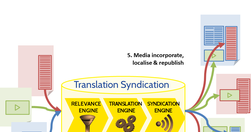Filter 573 resources:
- community (215)
- social media (110)
- comments (94)
- publicsphere (70)
- trust (68)
- media (64)
- news (60)
- participation (58)
- eu (56)
- troll (46)
- ocm (46)
- facebook (43)
- linkedin (41)
- engagement (39)
- disinformation (28)
- groupthink (28)
- blogging (24)
- event (24)
- ai (23)
- content strategy (20)
- psychology (19)
- multilingualism (19)
- democracy (18)
- bloggingportal (17)
- curation (17)
- web20 (17)
- science (16)
- journalism (16)
- medium (16)
- politics (15)
- bloggingportal2 (15)
- communications (15)
- filter bubble (15)
- ai4communities (14)
- crowdsourcing (14)
- bluesky (13)
- blog (13)
- atprotocol (13)
- innovation (12)
- algorithm (12)
- fediverse (12)
- identity (12)
- moderation (11)
- outreach (11)
- twitter (11)
- conversation (11)
- authenticity (11)
- bxlsbbl (10)
- trump (10)
- tool (10)
- europcom (10)
- conspiracy (10)
- storytelling (10)
- cofoe (9)
- science communication (9)
- design (9)
- k4p (9)
- promotion (9)
- us (9)
- english (7)
- cognitive (7)
- metrics (7)
- newsletter (7)
- covid19 (7)
- evidence-based policy (7)
- ec (7)
- collective intelligence (7)
- content (7)
- audience research (7)
- polarization (7)
- bot (7)
- knowledge management (7)
- privacy (6)
- social marketing (6)
- longform (6)
- euractiv (6)
- factchecking (6)
- eurosceptics (6)
- echo chamber (6)
- myhub (6)
- strategy (6)
- management (6)
- data (5)
- semantic (5)
- interactive (5)
- platform (5)
- video (5)
- ewrc2017 (5)
- open web (5)
- propaganda (5)
- web design (5)
- content marketing (5)
- ux (5)
- mastodon (5)
- marketing (5)
- regulation (5)
- influence (5)
- newsroom (5)
- information architecture (5)
- coral (5)
- tribe (5)
- brexit (4)
- google (4)
- drupal (4)
- blogger (4)
- russia (4)
- decentralised (4)
- ep (4)
- brussels bubble (4)
- open source (4)
- audiovisual (4)
- employee engagement (4)
- advertising (4)
- gender (4)
- enewsletter (4)
- usa (4)
- machine translation (4)
- themes (4)
- transparency (4)
- policy (4)
- wikipedia (4)
- attentionweb (3)
- instagram (3)
- qanon (3)
- bullshit (3)
- euroblog (3)
- collaboration (3)
- data journalism (3)
- chatgpt (3)
- podcast (3)
- llm (3)
- pr (3)
- atproto adoption (3)
- blogactiv (3)
- nytimes (3)
- vandenbrande (3)
- realtime (3)
- conference (3)
- game (3)
- internal communications (3)
- culture (3)
- post-truth (3)
- campaign (3)
- censorship (3)
- discourse (3)
- egovernment (3)
- atprotocol lexicon (3)
- search (3)
- native advertising (3)
- science journalism (3)
- hoax (3)
- lobby (3)
- semanticweb (3)
- signal2noise (3)
- mobocracy (2)
- productivity (2)
- blockchain (2)
- digital transformation (2)
- persuasion (2)
- project management (2)
- startup (2)
- reddit (2)
- backfire effect (2)
- nlp (2)
- consultation (2)
- organisation (2)
- business model (2)
- leadership (2)
- guide (2)
- free speech (2)
- augmented reality (2)
- design thinking (2)
- spambot (2)
- optimisation (2)
- debunk (2)
- chat (2)
- hr (2)
- hate (2)
- partisan (2)
- tumblr (2)
- local (2)
- climate (2)
- stream (2)
- online architecture (2)
- fascism (2)
- multimedia (2)
- slack (2)
- copyright (2)
- ft (2)
- mooc (2)
- dao (2)
- smartcities (2)
- future (2)
- europe (2)
- seo (2)
- editorial (2)
- eurosceptic (2)
- river4 (2)
- wiki (2)
- web (2)
- networking (2)
- australia (2)
- europa (2)
- roi (2)
- eci (2)
- survey (2)
- theme (2)
- portal (2)
- expert (2)
- livefyre (2)
- screencast (2)
- governance (2)
- gawker (2)
- eurocrap (2)
- letters2eu (2)
- co-creation (2)
- credibility (2)
- ltinnovate2016 (2)
- indieweb (2)
- substack (2)
- deep fake (2)
- research (2)
- lobbying (2)
- dissonance (2)
- us2020 (2)
- cozyweb (2)
- blogtour (2)
- tools (2)
- euractiv-com (2)
- eparticipation (2)
- learning (2)
- khub (2)
- syndicated-translation (2)
- comment (2)
- canonical debate lab (2)
- threads (2)
- robert putnam (2)
- idpi (2)
- model collapse (2)
- ruben verborgh (2)
- blacksky (2)
- eurosky (2)
- sovereignty (2)
- diig (1)
- hyperknowledge (1)
- massive.wiki (1)
- referendum (1)
- harvest (1)
- monetisation (1)
- cmv (1)
- motivated (1)
- pitch (1)
- spain (1)
- obama (1)
- web development (1)
- email (1)
- twitter migration (1)
- top3pods (1)
- support (1)
- github (1)
- training (1)
- opengov (1)
- digital garden (1)
- dark forest web (1)
- indignation (1)
- data union (1)
- slidecast (1)
- seenthis (1)
- meeting (1)
- egov (1)
- digg (1)
- #ilooklikeanengineer (1)
- disco (1)
- klout (1)
- ssi (1)
- network (1)
- society (1)
- b2b4me (1)
- gdpr (1)
- nasa (1)
- election (1)
- crowdfunding (1)
- logistics (1)
- bloom (1)
- game theory (1)
- technology (1)
- traffic (1)
- agent (1)
- energy (1)
- quit (1)
- responsive (1)
- douglas rushkoff (1)
- photography (1)
- hive (1)
- liveblogging (1)
- corporate journalism (1)
- antiviral (1)
- isismediablackout (1)
- surveillance (1)
- google+ (1)
- experiment (1)
- author (1)
- content partnership (1)
- sensecraft (1)
- big data (1)
- software (1)
- jeff jarvis (1)
- evolution (1)
- free our feeds (1)
- happeningo (1)
- calendar (1)
- anonymity (1)
- joan westenberg (1)
- forum (1)
- ecas (1)
- register (1)
- gpt-4o (1)
- listen (1)
- civil rights (1)
- right (1)
- synthesise (1)
- values (1)
- consultancy (1)
- geo (1)
- faceted search (1)
- nfc (1)
- internet of things (1)
- ibeacon (1)
- convert (1)
- cro (1)
- bbc (1)
- anuj ahooja (1)
- twxplorer (1)
- votewatch (1)
- mep (1)
- profile (1)
- new public (1)
- belgium (1)
- web2.0 (1)
- video_conferencing (1)
- interface (1)
- pluriverse (1)
- ethics (1)
- wikitribune (1)
- risk (1)
- knowledge panel (1)
- cultural exchange (1)
- sentiment analysis (1)
- meme (1)
- vlog (1)
- osmo (1)
- vsop (1)
- learn (1)
- pubhub (1)
- hangout (1)
- ugc (1)
- debatehub (1)
- ep2014 (1)
- stanbol (1)
- apache (1)
- rebut (1)
- meps (1)
- prezi (1)
- epale (1)
- opencalais (1)
- programme (1)
- education (1)
- scale (1)
- pilot (1)
- groupfeel (1)
- eesc (1)
- at4democracy (1)
- nhscitizen (1)
- conform (1)
- eu09vs19 (1)
- evidence (1)
- sortition (1)
- machine learning (1)
- popvox (1)
- micro.blog (1)
- posse (1)
- instant articles (1)
- public affairs (1)
- viral (1)
- interoperability (1)
- presseurop (1)
- geofence (1)
- computational propaganda (1)
- eu2024 (1)
- newsguard (1)
- pluralistic ignorance (1)
- robin berjon (1)
- machine text (1)
- infowar (1)
- apocalypse (1)
- geoengineer (1)
- nz (1)
- grassroots (1)
- wikinews (1)
- antivaxxer (1)
- cocomo (1)
- inscrutable (1)
- rail (1)
- talia stroud (1)
- bundle (1)
- inclusion (1)
- zettelkasten (1)
- infopocalypse (1)
- goodwill (1)
- cancel culture (1)
- eli pariser (1)
- gpt-x (1)
- unreality (1)
- bias (1)
- consent (1)
- stack overflow (1)
- activitypub (1)
- framework (1)
- media literacy (1)
- participatory culture (1)
- solid (1)
- adversarial interoperability (1)
- gab (1)
- blocklist (1)
- planetary (1)
- scuttlebutt (1)
- trust net (1)
- clubhouse (1)
- arg (1)
- floc (1)
- standards (1)
- w3c (1)
- presidency (1)
- dunbar (1)
- creativity (1)
- cambridge analytica (1)
- deletefacebook (1)
- launch (1)
- bluesky custom feeds (1)
- reflections (1)
- eu-treaty-institutions (1)
- eu-priorities-and-opinion (1)
- network effect (1)
- social-media (1)
- publicsectorinformation (1)
- cluetrain (1)
- addiction (1)
- programmes (1)
- information (1)
- rebuttal (1)
- ngo (1)
- truth (1)
- minimalist (1)
- lisp (1)
- yellow-card (1)
- eurosplinternet (1)
- whitewind (1)
- brand (1)
- life-in-belgium (1)
- hungarian (1)
- accreditation (1)
- bryan newbold (1)
- altmetric (1)
- integrate (1)
- open social (1)
- collaborate (1)
- explainer (1)
- virtual reality (1)
- justice-home-affairs (1)
- purity spiral (1)
- nft (1)
- ostrom (1)
- cooperatives (1)
- snapshot (1)
- multisig (1)
- d2d (1)
- knowledge graph (1)
- note (1)
- subconscious (1)
- fotl (1)
- betaworx (1)
- conference report (1)
- gordon brander (1)
- customer support (1)
- law (1)
- milo (1)
- open data (1)
- facebook live (1)
- resilience (1)
- visual (1)
- ideation (1)
- network theory (1)
- edelman (1)
- uk (1)
- crm (1)
- livestream (1)
- clickbait (1)
- sceptic (1)
- pattern language (1)
- religion (1)
- transmedia (1)
- snowfall (1)
- sponsored content (1)
- disruption (1)
- social capital (1)
- paywall (1)
- wisdom (1)
- referrals (1)
- scrollytelling (1)
- magazine (1)
- prototype (1)
- amp (1)
- cor (1)
- city (1)
- plexus (1)
- intimacy (1)
- region (1)
- analytics (1)
- 360video (1)
- ambassador (1)
- newsfeed (1)
- data visualisation (1)
- persona (1)
- cms (1)
- publishing (1)
- filter (1)
- jelly (1)
- data enrichment (1)
- perception (1)
- tourism (1)
- youth (1)
- medicine (1)
- mike masnick (1)
- airbnb (1)
- gtd (1)
- counter speech (1)
- intranet (1)
- messaging (1)
- ma parent (1)
- membership (1)
- vine (1)
- radio (1)
Relevant Overviews
- Communication Strategy
- Content Strategy
- Online Strategy
- Online Community Management
- Social Media Strategy
- Content Creation & Marketing
- Online Architecture
- Digital Transformation
- Personal Productivity
- Innovation Strategy
- Communications Tactics
- Psychology
- Social Web
- Media
- Politics
- Communications Strategy
- Science&Technology
- Business
Overview: Online Community Management
Convening a community can be the most powerful communication tactic there is.
Online communities offer enormous opportunities to the right organisation. Community members are far more likely to read your content, think of your organisation, give you feedback, share your content, attend your events, get involved in your programmes, and buy your products.
On the other hand, convening a community is hard: few people have time for more than a couple of online platforms in their lives, so attracting them to yours means you need to be uniquely useful to them.
That generally requires a change of mindset and new internal processes across the organisation, because it’s not your community - it's theirs. And getting their involvement means really listening to what they have to say, and then visibly acting on it.
I built the EU Commission’s first online community in 2002, and have built many more successful ones since. If you’d like to chat, get in touch.
More services: start with Communication strategy.
Relevant resources

Asking humans to judge each other can be a surprisingly powerful thing... But invoking a sense of being watched isn’t the only way platforms subliminally encourage social behaviour... persuasive design: if you want people to do something, don’t explain why, just show them how... If extremists seek to spread fear and shock, counterspeech might aim…

The afternoon session at Future Media Lab 2016 showed that while European media are warming to the idea of using advanced language technologies to share content across borders, their audiences are already well ahead of them.

Betts ... became the first data head to join the publisher’s board, recognizing data’s importance in growing its subscriptions and audience. Today, he heads up a 30-person team focused on customer analytics and research. Here are lessons from Betts on data maturity and driving audience engagement... While subscriptions are critical ... it’s not t…

"It tears conversations apart, and it's really confusing when some people have been live-tweeting an event and those things get scattered all across my timeline."

I spent a few minutes viewing the Twitter profiles of some of the people who've followed me recently and I was struck by how much of their TweetStreams were simply RTs of other people here in Brussels. Don't they have anything original to say?

Bots are to modern messaging apps what APIs were to Web 2.0; a way to build on top of other services, experiment, and create a new way of interacting with existing services... what inspiration can we draw from the past that might help us to think about designing Conversational UIs?

what started as a cynical in-joke has become a bad habit, and an excuse for enabling abuse across the web... The fact that we joke about it documents an acceptance of a culture of abuse online. It helps normalize online harassment campaigns and treat the empowerment of abusers as inevitable, rather than solvable... we denigrate a form that use…
“We can’t cede the social world to large companies.”... discussed the Times’ attitude toward commenters and shared the results of a Times survey that asked commenters why they comment:... News organizations, he said, need to make building community around news more of a priority. (Though, of course, that’s easy for an editor from the Times to s…

Three months into Dialog, I’m excited to say we’ve succeeded in creating a well-lit place for thoughtful, live conversations between the Digg community and the people who make the best stuff on the Internet... Clear community guidelines work. Pre-moderation works. And most of all, the amount of personalized attention we’re willing to give each use…

Tap into the wisdom of your citizensYour city platform for citizensourcing

With independent journalism increasingly looking like an endangered species, a EU communication strategy that helped European media build the European Public Sphere would be a smarter longterm move than propaganda and brochureware

As a reporte... there may be a simple solution to the bad commenter problem: You. When reporters get involved, it results in fewer uncivil comments, according to research... “it’s like a teacher walks into a classroom and suddenly all the kids are quiet and fold their hands at their desks.” Here are a few tips and best practices for reporters in …
uncivil comments dropped by 15 percent when reporters were participating in the conversation
a closer look at what types of comment sections news organizations ... value they are adding to news organizations’ overarching strategies...a list of questions to ask and best practices for news organizations seeking return on investment...key questions, considerations and links to further reading for evaluating what commenting strategy works bes…
The job of politics... finding common cause with people who aren’t like you. But current incentives seem to point in the opposite direction... I blame the internet ... You can’t take on inequality and injustice with a coalition of people who use the same slang, listen to the same music, and post the same emojis that you do.You have to be willing t…

Plebiscite-pushers have got Europe's voters hooked on the cheap rush of direct democracy

the idea that everyone is like us is called the “false-consensus bias.”... Online it means we can be blindsided by the opinions of our friends or, more broadly, America... morphs into a subconscious belief that we and our friends are the sane ones and that there’s a crazy “Other Side” ... that just doesn’t “get it,” ... not as intelligent as “us.”…

On Tuesday, the American people will see a multi-platform streaming and social broadcast of the State of the Union that reflects the ways people experience live events in 2016. We’ll be reaching people where they are — and making it possible for them to engage, respond, and share the President’s speech themselves in new and different ways... vide…

bringing new technology into the newsroom to change how the outlet commissions and publishes opinion pieces ... expand the coverage beyond just text, into visual story formats that can be accessed and shared across different platforms.... the FT's comment section is a "huge source of strength and a very valuable asset".... a new Facebook commu…

The extremist adherents of this new political correctness have essentially taken a flamethrower to the public space and annihilated its center. Topics in American life that once were the legitimate subjects of debate between liberals and conservative are now off-limits and lead to immediate attack by the cultural establishment if raised at all. An…

In recent years, a core group of commenters have helped to transform The New York Times for the digital era. Their voices have enhanced our journalism, offering new information, insight and analysis on many of the day’s most pressing issues.These frequent commenters have also become a community, one that has its own luminaries.But who are they? We…

Trump is what happens when social media becomes the platform for discourse.

the Internet now seems to be on constant boil... extremists of all stripes are ascendant, and just about everywhere you look, much of the Internet is terrible...social networks seem to be feeding a cycle of action and reaction. In just about every news event, the Internet’s reaction to the situation becomes a follow-on part of the story, so that …

people today are inundated with more bullshit now than ever before... We presented approximately 800 participants across four studies with statements ranging from the mundane to the meaningful. We included some bullshit too... People who were more religious, more likely to believe in the paranormal, and more accepting of alternative medicine were…
not much drives traffic as effectively as stories that vindicate and/or inflame the biases of their readers... specifically tries to invent stories that will provoke strong reactions in middle-aged conservatives. They share a lot on Facebook... they’re the ideal audience. institutional distrust and cognitive bias are so strong that the people who…

We are creating open-source tools and resources for publishers of all sizes to build better communities around their journalism. We also collect, support, and share practices, tools, and studies to improve communities on the web. All of our tools are open source and free... small, flexible tools that plug into each other and also work with exist…
On Thursday night, as part of its ongoing coverage of the shootings in San Bernardino, Calif., The New York Times highlighted reader comments in one of its most prominent digital spaces: The top of its homepage... While Times journalists interact with readers on social platforms, the paper also makes an effort to bring the conversation back to …

If there was an idea that could ‘fix’ democracy, it would have been thought-up already... When I started working on GovTrack, I thought I was building an accountability tool. If only the American public had more information they could head-off failures in government by voting more effectively in elections. ... I was wrong. The world is complic…

Over 40 new resources ... some great longreads to enjoy as the nights grow long, the productivity tips you’ll need to find the time to read them, and a free set of steak knives. The Christmas season, after all, is almost upon us.
Loading more...
Relevant Overviews
- Communication Strategy
- Content Strategy
- Online Strategy
- Online Community Management
- Social Media Strategy
- Content Creation & Marketing
- Online Architecture
- Digital Transformation
- Personal Productivity
- Innovation Strategy
- Communications Tactics
- Psychology
- Social Web
- Media
- Politics
- Communications Strategy
- Science&Technology
- Business
